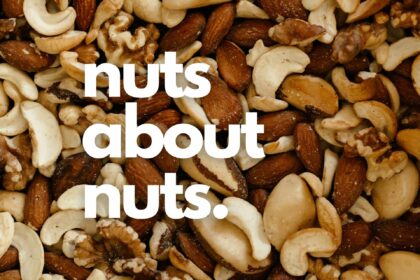Olive oil is great for dressing salads and stir-frying veggies, but did you know that it could also boost your brain power, support heart health, and improve your skin?
In this article we’ll examine the benefits of adding more olive oil to your diet and provide some simple, practical ways you can start consuming more. We’ll also look at the health giving properties of olive oil and recommend the best type of olive oil to use and why it’s the best.
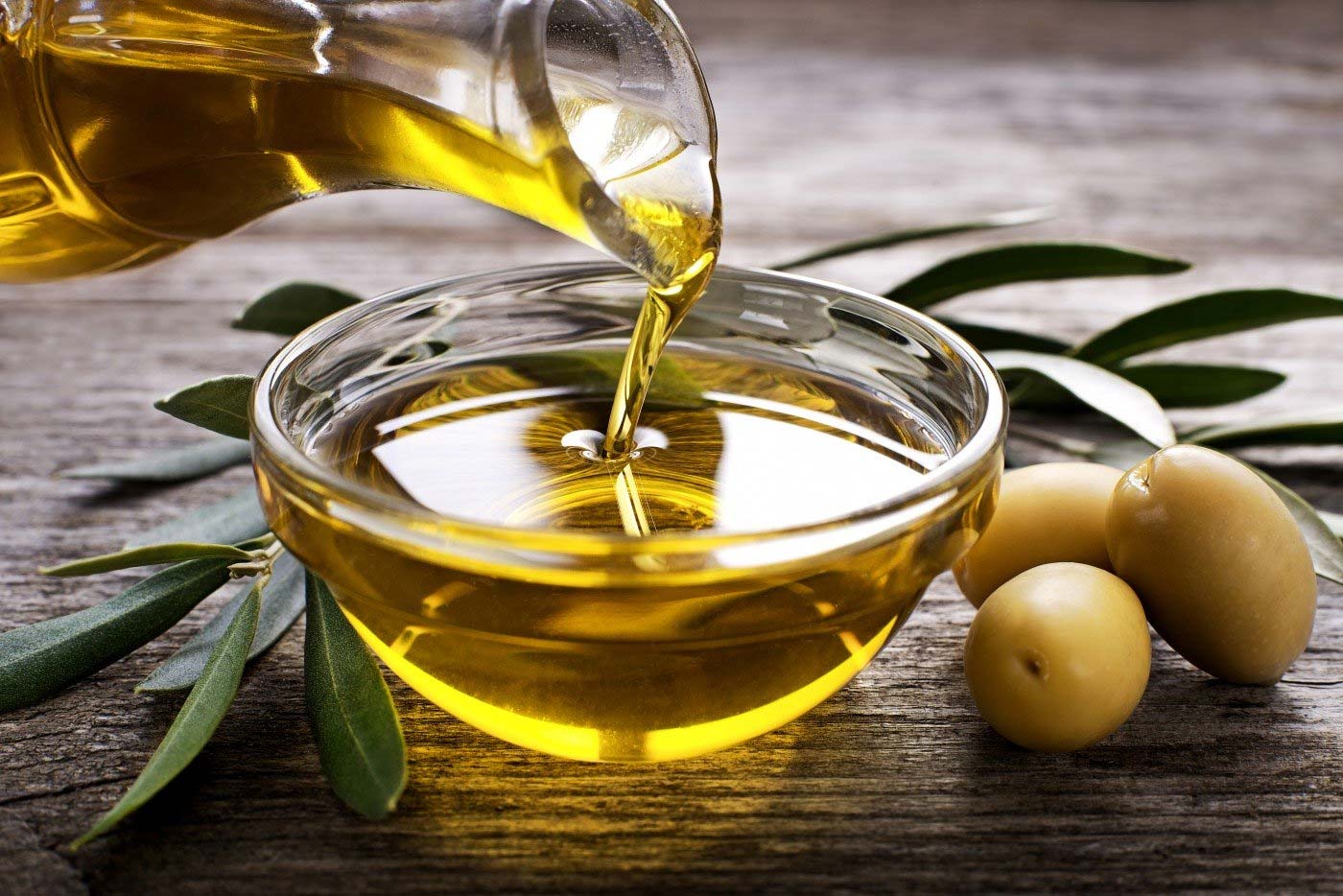
The Missing Ingredient in Optimal Health: Olive Oil
In today’s fast-paced world, maintaining optimal health and performance is a common challenge, especially for those leading active lifestyles. Many people focus on getting enough protein, carbs, and hydration, but often overlook the importance of incorporating the right types of fats into their diet. This oversight can lead to missed opportunities to boost energy, enhance workout recovery, and improve overall well-being.
The truth is, not all fats are created equal. While unhealthy fats can contribute to weight gain and other health issues, healthy fats are essential for fueling the body, protecting the heart, and supporting longevity. Without the right type of fat in their diet, even the most health-conscious amongst us can struggle with energy dips, poor recovery, and inflammation.
Active people who are passionate about fitness, nutrition, and healthy living need a reliable source of good fats that’s not only a great source of energy, but also benefits their long-term health. This is where extra virgin olive oil comes in – it’s a natural, nutrient-rich powerhouse that offers a whole host of benefits that often get overlooked.
Extra Virgin Olive Oil: The Game-Changing Solution for Health
Enter extra virgin olive oil: a simple, natural, and powerful addition to your diet that can significantly improve your health and general wellbeing. Extra virgin olive oil (EVOO) is packed with healthy monounsaturated fats, antioxidants, and anti-inflammatory compounds that are crucial for maintaining energy, supporting heart health, and promoting longevity.
Unlike saturated fats that may contribute to inflammation or unhealthy weight gain, EVOO is a source of healthy fats that actively work to protect your body from oxidative stress and inflammation. The high levels of polyphenols found in extra virgin olive oil help reduce inflammation, boost immunity, and enhance overall vitality, making it an essential component for anyone leading an active and health-conscious lifestyle.
The US National Library of Medicine documents that “epidemiological studies strongly suggested that long term consumption of diets rich in plant polyphenols offered some protection against development of cancers, cardiovascular diseases, diabetes, osteoporosis and neurodegenerative diseases”.
Fortunately, incorporating olive oil into your daily diet is straightforward. You can use it as a dressing for salads, drizzle it over vegetables, or cook with it at moderate temperatures. The hardcore amongst you can even take a tablespoon with breakfast. The point is that despite its strong flavor, it’s easy to incorporate some extra olive oil into your diet. And by adding some EVOO, you can harness the power of healthy fats to fuel your body, protect your heart, and enhance your well-being.
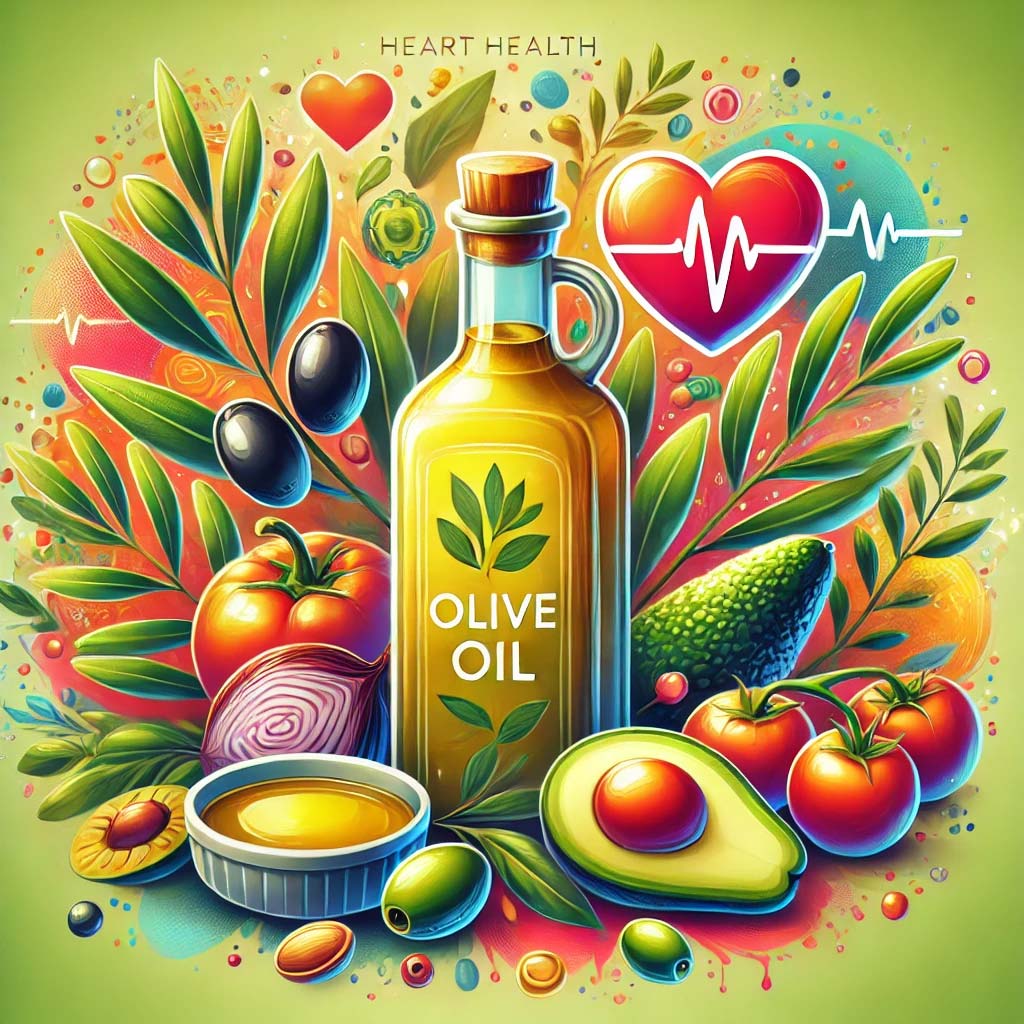
The Powerful Benefits of Extra Virgin Olive Oil
By leveraging the benefits of extra virgin olive oil you’ll enhance your health, boost energy levels, and improve your overall quality of life. Work towards incorporating EVOO into your meals and experience the powerful impact of this natural, nutrient-dense food.
1. Heart Health
Extra virgin olive oil is one of the most stable oils. Consequently, it’s rich in monounsaturated fats, particularly oleic acid, an omega-9 fatty acid, which has been shown to reduce “bad” LDL cholesterol while maintaining or even boosting “good” HDL cholesterol. This helps reduce the risk of heart disease and keeps your cardiovascular system functioning optimally. The polyphenols in EVOO also help protect the lining of blood vessels, improving overall heart health.
2. Anti-Inflammatory Properties
The high polyphenol content in extra virgin olive oil provides potent anti-inflammatory benefits. Oleocanthal, a natural compound found in EVOO, has similar effects to anti-inflammatory medications like ibuprofen. In fact, consuming just 50 grams (more than three and a half tablespoons) of typical extra virgin olive oil per day contains enough oleocanthal to provide an anti-inflammatory effect comparable to approximately 1/10 of an adult ibuprofen dose.
This means that even small, consistent amounts of EVOO can have a significant impact on reducing chronic inflammation over time. Long-term consumption of extra virgin olive oil is thought to be a key factor in the lower rates of heart disease, Alzheimer’s disease, and other inflammatory conditions observed in populations that follow a Mediterranean diet. By reducing chronic inflammation, EVOO helps to protect overall health and supports a longer, healthier life.
3. Olive Oil is an Antioxidant Powerhouse
EVOO is loaded with antioxidants, such as vitamin E and polyphenols, which help protect the body from oxidative stress. Oxidative stress is linked to aging and many chronic diseases. By incorporating EVOO into your diet, you can help neutralize free radicals and reduce cellular damage, promoting overall health and longevity.
4. Enhanced Athletic Performance and Recovery
For active individuals, olive oil is an excellent source of healthy fats which the body stores helping to sustain energy levels during workouts. But, there’s no point taking a big glug of olive oil just before or during a run. Your body will not absorb fat very well during exercise, so to feel the benefit, it’s important that you’re consuming small amounts of olive oil over time as part of a healthy diet.
Its anti-inflammatory properties also aid in faster recovery after intense physical activity by reducing muscle soreness and promoting efficient muscle repair.
EVOO also helps replenish glycogen stores, supporting effective recovery after exercise. Runners World magazine points out that after a hard workout you’ll deplete 50 percent or more of the glycogen in the affected muscles, and it will typically take 20 to 24 hours before you’re able to completely refill them.
In an article titled How (and How Not) to Refuel, it points to a study back in the 1980s which introduced the concept of a “window of opportunity” during which your muscles can store glycogen more quickly. So eat some pasta with olive oil right after your workout, and you’ll restock glycogen faster than if you eat the same thing two hours later.
5. Improved Brain Health
The antioxidants and healthy fats in EVOO are known to support cognitive function and protect against neurodegenerative diseases. The polyphenols in extra virgin olive oil help protect brain cells from oxidative damage, reducing the risk of Alzheimer’s and other forms of cognitive decline. We all want to live longer, healthier lives, and brain health is fundamental to this, so look for ways you can add extra olive oil to your diet.
6. Supports Weight Management
While it may seem counterintuitive, incorporating EVOO into your diet can actually aid in weight management. The healthy fats in olive oil help keep you fuller for longer, reducing overall calorie intake. Studies have shown that diets rich in monounsaturated fats, like those found in EVOO, can contribute to a healthier body weight and improved metabolic health (how well your body processes food). Furthermore, monounsaturated fats can help reduce bad cholesterol levels in your blood, which can lower your risk of heart disease and stroke.
7. Skin Health and Anti-Aging
Extra virgin olive oil is not only beneficial internally but also externally. The antioxidants and vitamin E in EVOO help nourish the skin from within, reduce oxidative damage, and maintain skin elasticity. Regular consumption of EVOO can contribute to a healthier, more youthful complexion, reducing the visible signs of aging.
The well-being journal MYSA suggests applying olive oil directly to your skin. Olive oil contains antioxidants, including vitamin E, which help calm redness and irritation caused by acne or psoriasis. They also protect against free radicals that can lead to wrinkles and premature aging of the skin. Applying pure, cold-pressed olive oil to affected areas of the skin can help your body heal by moisturizing the skin and keeping it hydrated. You can even mix olive oil with your favourite moisturizer. MYSA suggests 1/3 olive oil to 2/3 moisturizer.
8. Blood Sugar Control
EVOO may also help regulate blood sugar levels, which is particularly important for those with or at risk of type 2 diabetes. The high levels of monounsaturated fats in EVOO improve insulin sensitivity, allowing the body to use insulin more efficiently to process glucose. This means that sugars in your food are more effectively converted into energy rather than building up in the bloodstream.
Studies have shown that regular consumption of EVOO can lead to lower post-meal blood sugar spikes, making it a smart choice for maintaining stable blood sugar levels and reducing the risk of diabetes-related complications.
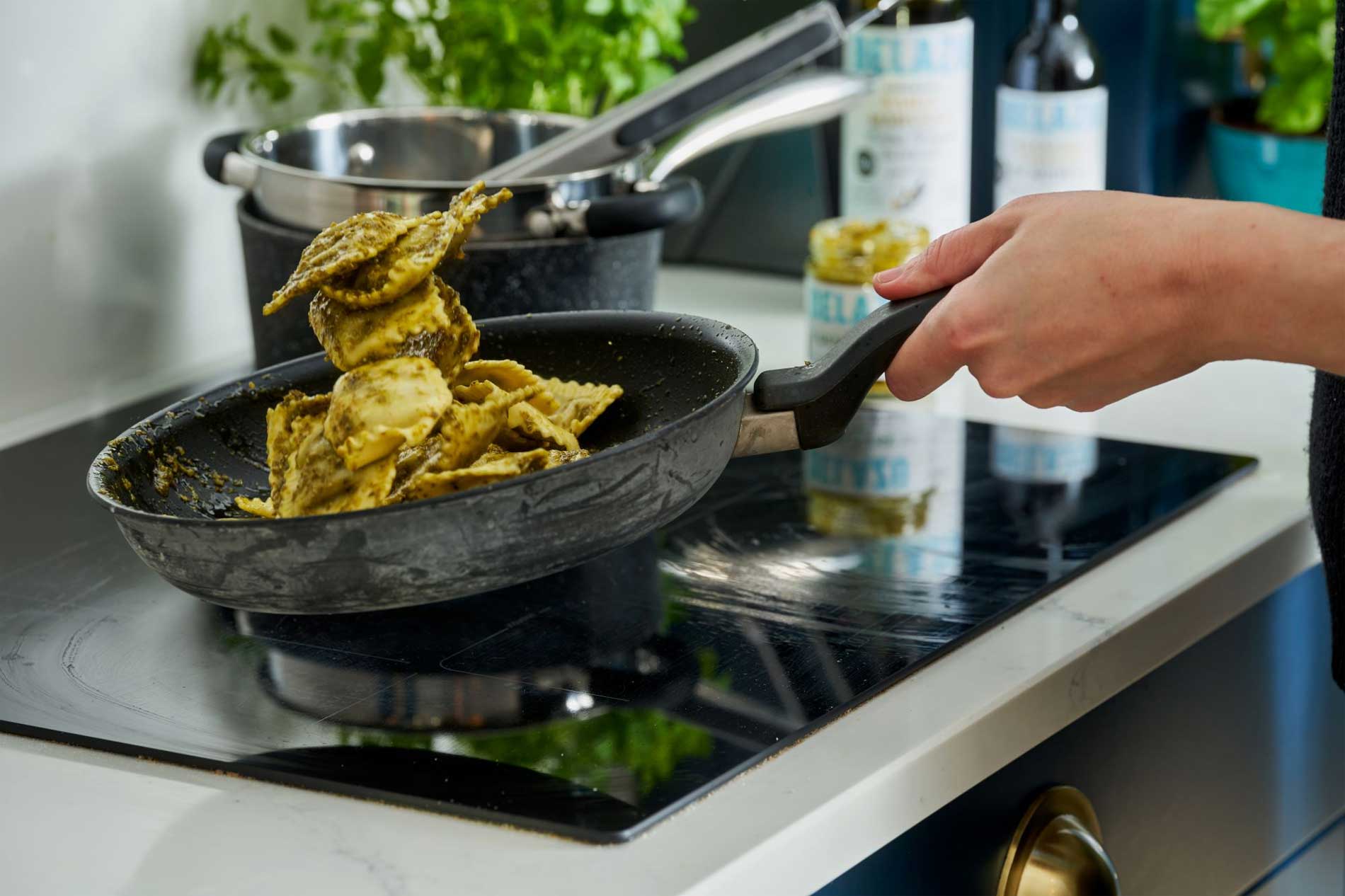
How to Add Extra Virgin Olive Oil to Your Daily Routine
It’s easy to add some extra olive oil to your diet and as we’ve seen, the health benefits are significant. The important thing is to keep it simple and as inexpensive as possible. Here are some practical tips to help you get started:
Use It as a Salad Dressing
One of the easiest ways to incorporate EVOO is by using it as a dressing for salads. Combine EVOO with balsamic vinegar, lemon juice, or herbs for a flavorful and healthy topping that enhances the nutritional value of your greens.
Drizzle Over Vegetables
After roasting or steaming vegetables, drizzle some extra virgin olive oil on top. It not only adds a rich flavor but also helps your body absorb fat-soluble vitamins like A, D, E, and K from the vegetables.
Cook with Moderate Heat
EVOO is great for cooking at moderate temperatures, such as sautéing or stir-frying. Avoid high-heat cooking, as this can reduce the health benefits of the oil. Use it for gentle cooking to retain its nutrient profile.
Add a Spoonful of Olive Oil to Smoothies
Adding a tablespoon of olive oil to your morning smoothie can boost the healthy fat content and provide a creamy texture. This is an easy way to start your day with the anti-inflammatory and antioxidant benefits of EVOO.
Use It in Baking
Replace butter or other oils with extra virgin olive oil in your baking recipes. EVOO works well in cakes, muffins, and bread, adding moisture and a slight richness while keeping your baked goods healthier. For example, if you’re baking bread, you can substitute 30 grams (1 oz) of butter for 30 millilitres (1 fl oz) of olive oil.
Dip for Bread
Instead of using butter, try dipping your sourdough bread in extra virgin olive oil mixed with herbs or a dash of balsamic vinegar. This makes for a heart-healthy and flavorful alternative to butter.
Another thing to try is to make your own hummus. Made from chickpeas, tahini, olive oil and lemon, it’s simple, delicious and nutritious. The olive oil gives the hummus a luxuriously smooth texture. You can also drizzle a little extra on top when serving. For an even healthier option, try substituting the bread for raw vegetables including carrots, celery, peppers (capsicum) , broccoli, etc.
Finish Soups and Stews
Add a drizzle of olive oil to your soups or stews just before serving. The EVOO adds a depth of flavor and ensures you’re getting the maximum health benefits without subjecting the oil to prolonged heat.
Marinades for Meat and Fish
Use EVOO as a base for marinades for meats, poultry, or fish. The healthy fats in the oil help keep the protein moist during cooking and add extra flavor.
To make a quick marinade for roast chicken, pour a good glug of olive oil into a bowl, add some dried thyme, freshly ground black pepper and a pinch of salt. Then use a brush to coat the chicken before putting it in the oven. You can add some crushed garlic to the mix if you want a more punchy flavor.
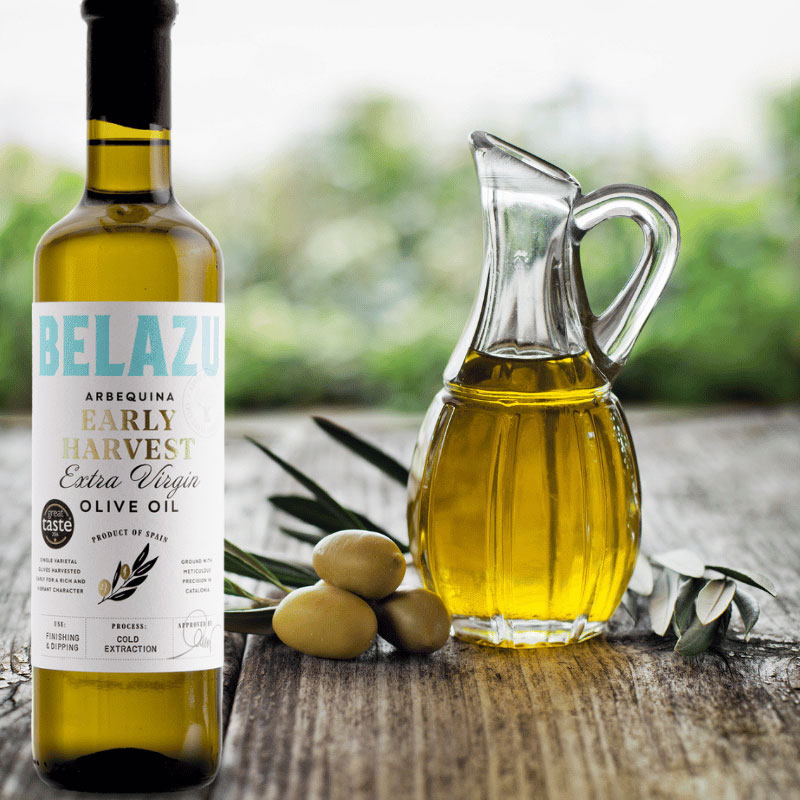
Is extra virgin better for my health than regular olive oil?
Yes, extra virgin olive oil (EVOO) is generally better for your health compared to regular (or refined) olive oil. The difference lies in how the oils are produced, their nutrient profiles, and overall quality. Here’s a closer look at what makes extra virgin olive oil different from regular olive oil and why it’s healthier:
1. Production Process
Extra Virgin Olive Oil: EVOO is made through mechanical cold pressing, without the use of excessive heat or chemical solvents. This ensures the oil retains its natural nutrients and flavor.
Regular Olive Oil: Regular olive oil, also known as refined or pure olive oil, undergoes refining processes that often include heat or chemical treatments. This processing can strip away beneficial compounds and reduce the nutritional value.
2. Nutrient and Antioxidant Content
Higher Antioxidant Levels: Extra virgin olive oil is rich in polyphenols and other antioxidants, which are associated with various health benefits, including anti-inflammatory effects, improved heart health, and protection against oxidative stress.
Lower Antioxidants in Regular Olive Oil: The refining process for regular olive oil significantly reduces its levels of antioxidants and polyphenols, making it less beneficial from a health standpoint.
3. Flavor and Quality Standards
Flavor Profile: EVOO has a robust flavor with fruity, peppery, or slightly bitter notes, which is an indication of its quality and high polyphenol content. Regular olive oil, in contrast, has a more neutral flavor since refining removes many of the natural flavors found in olives.
Quality Criteria: EVOO must meet strict quality standards, including low acidity (less than 0.8%) and passing sensory tests for taste and aroma. This ensures that EVOO is unrefined and high quality, whereas regular olive oil can have a higher acidity level (up to 2%) and may be a blend of refined and unrefined oils.
4. Health Benefits
Heart Health: EVOO’s high content of monounsaturated fats (primarily oleic acid) and antioxidants makes it particularly effective at reducing bad LDL cholesterol, increasing good HDL cholesterol, and supporting overall cardiovascular health. These benefits are less pronounced in regular olive oil due to reduced nutrient levels.
Anti-Inflammatory and Anti-Cancer Properties: The polyphenols and other compounds in EVOO, such as oleocanthal, have anti-inflammatory effects that help reduce the risk of chronic diseases, such as cardiovascular diseases, certain cancers, and neurodegenerative conditions like Alzheimer’s. These anti-inflammatory properties are largely diminished in regular olive oil.
5. Less Processing, More Health Benefits
Unrefined vs. Refined: EVOO is unrefined, which means it keeps more of the natural compounds that make olive oil healthy. Regular olive oil, which is often refined to remove impurities, loses a substantial amount of its beneficial compounds during processing.
6. Oxidation and Stability
Better Oxidative Stability: EVOO’s antioxidants help protect the oil from oxidation, which makes it more stable and less prone to turning rancid compared to regular olive oil. This also means EVOO retains more of its health benefits over time, particularly when stored properly (in a cool, dark place).
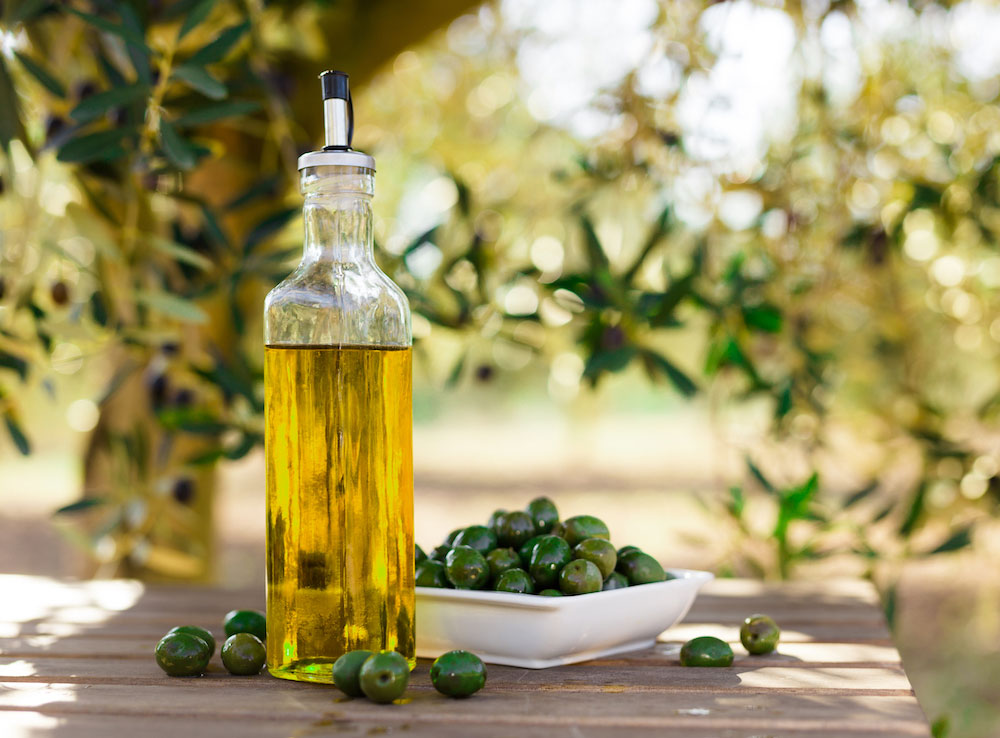
Expensive vs. Mass-Market Extra Virgin Olive Oil
Both expensive and cheaper cold-pressed extra virgin olive oils offer health benefits, but the differences in production quality, polyphenol content, freshness, and storage can significantly impact the extent of those benefits.
Here are the main factors to consider:
1. Quality of Olives Used
- Premium Quality: Expensive EVOO is often made from higher-quality olives that are carefully selected at their peak ripeness. These olives are typically harvested earlier, when the levels of antioxidants, particularly polyphenols, are at their highest. Higher-quality olives contribute to a richer nutrient profile, which results in greater health benefits.
- Mass-Market Quality: Cheaper EVOO may use olives of varying quality, including those that are overripe or less carefully harvested. This can result in a lower polyphenol content and fewer antioxidants, which reduces the health benefits.
2. Harvesting and Production Methods
Extra virgin olive oil can be produced using two different processes: first cold pressing or cold extraction. Although similar, these methods influence the classification and quality of the final product. First cold pressing involves extracting the oil from olives without the use of heat, preserving the nutrients and flavor. Cold extraction, on the other hand, uses mechanical means without excessive heat to obtain the oil. Both processes ensure high quality, but first cold pressing is often seen as producing a more premium oil due to its traditional and careful extraction method.
- Early Harvest and Immediate Pressing: Premium EVOO is often made using olives that are harvested early in the season and pressed immediately after harvest. This ensures a high antioxidant level and better preservation of healthy compounds.
- First Cold Pressing: This process involves crushing olives into a paste using a stone mill and then spreading the paste onto mats. These mats are stacked in a hydraulic press that applies intense pressure to separate the liquid, which contains both water and oil. The liquid is then decanted to separate the oil from the water, ensuring that only pure olive oil is collected for bottling. This traditional method helps preserve the natural flavors and health benefits of the oil.
- Cold extraction: This involves grinding olives into a paste at around 27°C and then using centrifugation to separate the oil, water, and solid residue. This method minimizes oxidation risks and preserves the quality and aroma of the oil. The resulting oil is packaged in dark glass bottles to maintain its freshness and nutrient content.
- Delayed Processing: Cheaper EVOOs may use olives that have been harvested later in the season or pressed after some delay, which can lead to oxidation and a reduction in beneficial compounds.
3. Polyphenol and Antioxidant Levels
- Higher Polyphenol Content: The polyphenol content of expensive EVOO is typically higher due to better olive selection, early harvest, and careful extraction processes. Polyphenols have numerous health benefits, including anti-inflammatory, antioxidant, and cardiovascular protection properties.
- Lower Polyphenol Content: Cheaper EVOOs may have fewer polyphenols because they often come from mass production, where emphasis is placed more on volume rather than nutrient quality. The reduction in polyphenols directly diminishes the oil’s effectiveness in promoting heart health and reducing inflammation.
4. Flavor and Sensory Quality
- Robust Flavor Indicates High Quality: Expensive EVOO often has a robust flavor with fruity, peppery, or bitter notes, which is a sign of high polyphenol content. These are the same polyphenols that contribute to many of the health benefits. The stronger the flavor, the more likely it is that the oil retains higher amounts of healthful compounds.
- Milder Flavor: Cheaper EVOO tends to have a milder, less intense flavor, which may indicate lower polyphenol levels. The milder flavor is often the result of using olives that are less rich in nutrients or a less careful extraction process.
5. Olive Oil Production Standards
- Smaller Batch and Artisanal Production: Expensive EVOOs are often produced in smaller batches, with more care taken to ensure that the oil remains fresh and unoxidized. This preserves more of the beneficial nutrients.
- Mass Production: Cheaper EVOOs are produced in large quantities, and while they may still be labeled as cold-pressed and extra virgin, the standards of handling and processing may lead to nutrient loss. Exposure to light, air, or higher temperatures during production or storage can compromise the quality.
6. Storage and Packaging
- High-Quality Packaging: Premium EVOO is often bottled in dark glass or other light-protective materials to prevent oxidation and preserve its beneficial compounds. Proper packaging helps retain the health benefits longer.
- Less Protective Packaging: Mass-market EVOOs might be packaged in clear bottles or lower-quality materials, which can lead to quicker oxidation when exposed to light and air. This means that the oil loses its health benefits faster compared to properly stored premium EVOO.
7. Freshness
- Focus on Freshness: Expensive EVOOs are often fresher because they are produced in smaller quantities and are made available soon after production. Freshness is crucial for maintaining the highest levels of antioxidants and polyphenols.
- Longer Shelf Life: Mass-market EVOOs might spend more time in transit and on store shelves before being purchased. The longer the oil sits, the more its quality and health benefits diminish, especially if it is not properly stored.
For the best health benefits, unfortunately it is a classic case of “you get what you pay for”. So, if your budget can stretch to it, choose a high-quality extra virgin olive oil that is fresh, well-packaged, and robust in flavor.
Why is early harvest olive oil better?
Early harvest olive oil is considered superior because it contains higher levels of polyphenols, antioxidants, and other nutrients that provide a wide range of health benefits, including reducing inflammation, supporting cardiovascular health, and improving oxidative stability.
Here’s a detailed look at why early harvest olive oil is better:
1. Higher Polyphenol Content
- Antioxidant Rich: Olives that are harvested early in the season, typically while still green or just beginning to ripen, have significantly higher levels of polyphenols compared to fully ripe olives. Polyphenols are powerful antioxidants that provide numerous health benefits, such as reducing inflammation, protecting against oxidative stress, and supporting heart health.
- Health Benefits: Because early harvest olive oil has a higher polyphenol content, it is more effective at reducing the risk of chronic diseases, such as cardiovascular disease and certain cancers, and provides better anti-inflammatory and immune-boosting benefits.
2. Enhanced Anti-Inflammatory Properties
- Oleocanthal Content: Early harvest olive oil often contains more oleocanthal, a natural compound with anti-inflammatory effects similar to ibuprofen. This makes it particularly beneficial for reducing inflammation in the body, which is linked to various health conditions such as arthritis, cardiovascular disease, and metabolic disorders.
3. More Nutrients Retained
- Cold Extraction: Early harvest olives are usually pressed using a cold extraction process, which helps preserve not only polyphenols but also other beneficial nutrients like vitamin E and phytosterols. These nutrients contribute to the overall health benefits of the oil, including better skin health, immune support, and cardiovascular protection.
4. More Stable Oil
- Lower Oxidation Risk: Early harvest olive oil tends to be more stable due to its higher antioxidant content, which helps prevent the oil from oxidizing. Oxidation can lead to rancidity and loss of beneficial nutrients. The higher polyphenol levels help preserve the oil, making it last longer and retain more of its health-promoting properties over time.
5. Lower Acidity Level
- Quality Indicator: Early harvest olive oil generally has a lower free acidity level, which is an important indicator of quality. A lower acidity level (typically less than 0.3% in high-quality extra virgin olive oil) is associated with better taste, higher nutritional value, and greater stability. The low acidity also means that the oil is less processed, making it healthier.
6. Richer Flavor Profile
- Bold, Fruity, and Bitter Notes: The flavor of early harvest olive oil tends to be more robust, with intense fruity, peppery, and slightly bitter notes. These flavors are a sign of the high polyphenol content. The bitterness and peppery sensation come from oleuropein and oleocanthal, both of which contribute to the oil’s health benefits. The richer flavor profile also enhances culinary dishes, making it a preferred choice among chefs and food enthusiasts.
7. Less Yield but Higher Quality
- Lower Yield, Higher Potency: Early harvest olives produce less oil because they have a lower oil content compared to fully ripened olives. While this makes the oil more expensive, it also means that the oil is richer in nutrients and beneficial compounds. The lower yield ensures that early harvest olive oil is packed with higher concentrations of the healthy components that make olive oil so beneficial.
8. Early Harvest and Health
- Support for Heart Health: The increased polyphenol content in early harvest olive oil contributes to greater cardiovascular health benefits. These compounds help reduce “bad” LDL cholesterol, increase “good” HDL cholesterol, and protect blood vessels from oxidative damage, reducing the risk of heart disease.
- Enhanced Anti-Cancer Properties: Polyphenols in early harvest olive oil have also been linked to anti-cancer properties by reducing oxidative stress and inflammation, both of which are contributing factors to cancer development.
So, despite the fact that early harvest olive oil produces a lower yield and is often more expensive, its richer flavor, superior nutrient content, and greater stability make it worth the investment, especially if you’re looking to maximize the health benefits of olive oil.
Top Olive Oil Producing Countries by Total Awards
Right, I’m sold, but which olive oil should I buy and which country produces the best quality EVOO?
When it comes to olive oil production, a handful of countries dominate the global stage, consistently winning top awards for their excellence. We looked at EVOO World Ranking’s EVOO of the year 2023 data to gain some insights.
Leading the pack is Turkey, securing the highest number of awards, a testament to its long-standing tradition and expertise in olive cultivation.
Spain follows closely, renowned for its diverse range of high-quality oils and innovation in sustainable practices. Italy and Greece also hold prominent positions, each known for their distinctive flavors and varieties, often tied to their rich histories of olive oil production.
Together, these four countries account for nearly three quarters of global olive oil accolades, underscoring their roles as industry leaders. Other countries, while smaller in scale, continue to make significant contributions, further highlighting the international appreciation for premium olive oil.
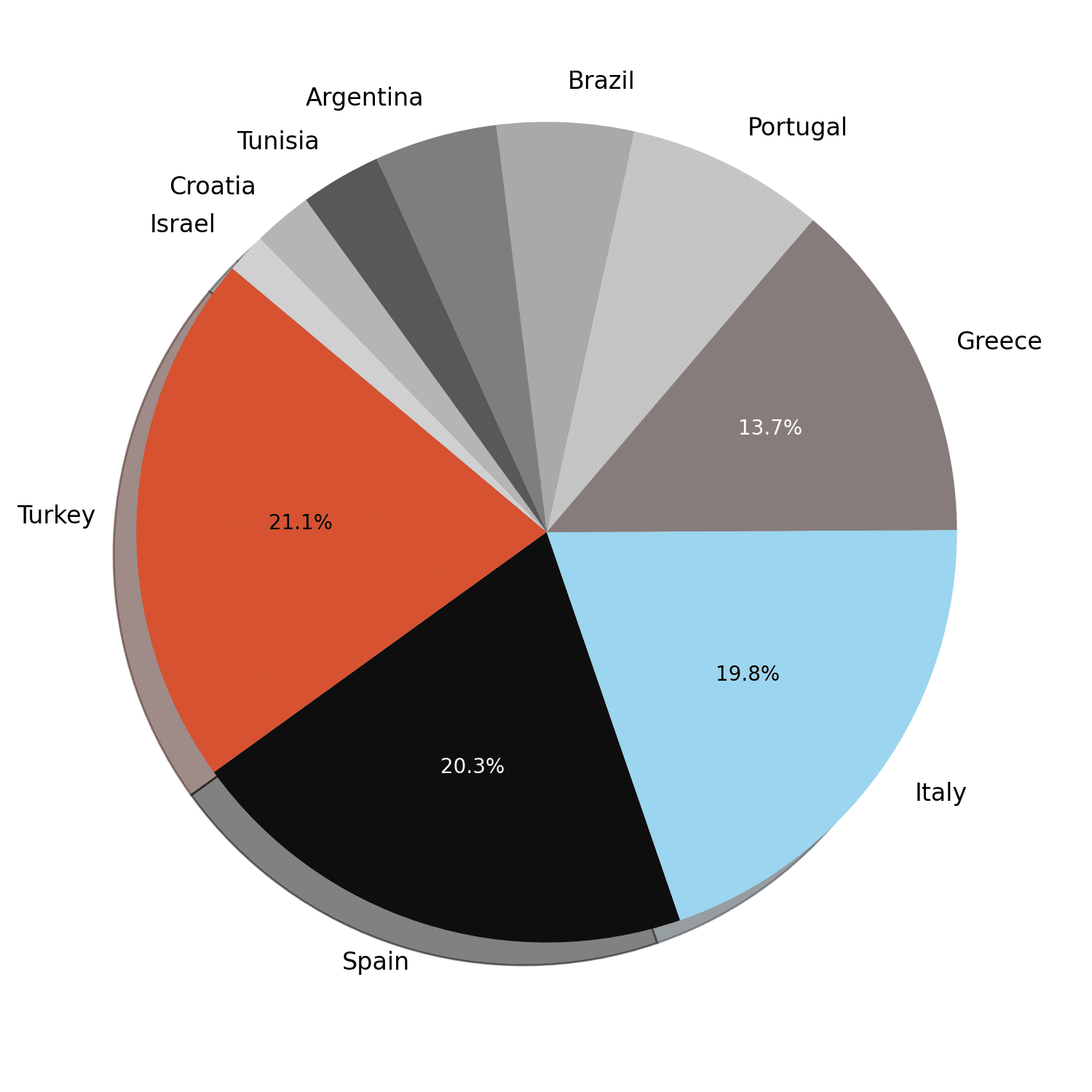
We also drilled down into the numbers to pull out the top 5 olive oil companies by total awards:
- Gallo Worldwide – Victor Guedes S.A. (143 awards) – Portugal
- Almazaras de La Subbética S.L. (135 awards) – Spain
- Olivícola Laur – Millan S.A. (105 awards) – Argentina
- Nova Vera Gida ve Tarim San. Tic. A.S. (103 awards) – Turkey
- Goya En Espana S.A.U. (101 awards) – Spain
Among the top olive oil producers, Portugal’s Gallo Worldwide – Victor Guedes S.A. leads the way with an impressive 143 awards, demonstrating the country’s excellence in olive oil production. Spain follows closely with two standout producers: Almazaras de La Subbética S.L. (135 awards) and Goya En Espana S.A.U. (101 awards), showcasing Spain’s dominance in the global market. Argentina’s Olivícola Laur – Millan S.A. also shines with 105 awards, highlighting the growing reputation of South American olive oil, while Turkey’s Nova Vera Gida ve Tarim San. Tic. A.S. rounds out the top five with 103 awards, contributing to Turkey’s growing influence in the industry.
Conclusion
Extra virgin olive oil is a powerful addition to any health-conscious diet. It provides numerous benefits, from supporting heart health and reducing inflammation to enhancing athletic performance, improving cognitive function, aiding in weight management, and promoting skin health. The high content of monounsaturated fats, antioxidants, and polyphenols makes EVOO an excellent choice for those looking to improve overall well-being.
Incorporating EVOO into your daily routine is easy. You can use it as a salad dressing, drizzle it over vegetables, or include it as an ingredient in cooking and baking. By incorporating it into your diet, you’ll boost your intake of healthy fats and enjoy a wide range of health-promoting effects.
By choosing quality extra virgin olive oil, especially an early harvest one produced through careful methods like cold extraction, you ensure you are getting the maximum health benefits.
If you’re aiming for longevity, vitality, and optimal health (and let’s face it, who isn’t), try adding some extra virgin olive oil to any meal and start feeling the benefits.

